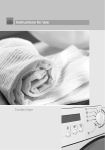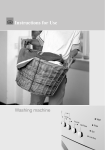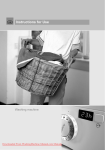Download Smeg 155620 Washer User Manual
Transcript
Instructions for Use Washing machine Thank you for your confidence in purchasing our washing machine, and congratulations on the excellent choice. Your new washing machine meets the requirements of modern treatment of laundry. It is rational in the consumption of energy, water and washing agents. Our appliances are friendly to the environment. Some of the materials may be recycled, others deposited or decomposed. To avoid pollution of environment, once your appliance is no longer useful, take it to your local authorized waste appliance dealer. Description of washing machine ..................... 3 Cautions ............................................................. 4 Installation and connection .............................. 6 Operation ......................................................... 10 Tips for washing and saving energy ............. 23 Cleaning and maintenance ............................. 25 Failures............................................................. 28 155620 Tables ............................................................... 31 2 Description of washing machine 1. Front panel 2. Detergent dispenser 3. Door (depending on the model) 4. Filter lid • Model (WA63xxx, WA64xxx) Dimensions (w x d x h): 600 mm x 600 mm x 850 mm Depth with door open: 106 cm Weight (net): 90 kg Nominal voltage: 230 V, 50 Hz Power: 2300 W Max. load: 6 kg Power socket: (230 V, 50 Hz, 10 A) Water pressure: min. 0,05 MPa, max. 0,8 MPa Fuse: 10 A 155620 Technical information 5. Adjustable legs 6. Water outlet hose 7. Water inlet hose 8. Mains power cable 3 Cautions • Be sure to remove transport brackets prior • • • • • • • • • • • 155620 4 first use of the appliance. Attempted operation of the blocked machine may result in irreparable damage which is not covered by the manufacturer’s warranty! When connecting your washing machine to water supply, be sure to use brand new water inlet hose and appropriate sealing gaskets (attached). Do not locate the machine in a room with temperature below 0°C. Parts of the machine may be damaged if frozen. Install the washing machine in a perfectly horizontal position, on solid flat concrete floor. Follow the instructions for correct installation and water and mains connections. Never immerse the end of the drain hose into the draining water. Prior starting the washing cycle lock the door by pressing them at the designed spot. Door may not be open during the washing cycle. Use only detergents and softeners for machine wash. Manufacturer may not assume responsibility for any damage and eventual discoloring of gaskets and plastic components as a consequence of incorrect use of bleach and/or coloring agents. For removal of lime residues use such agents with added anti-corrosion agents. Follow the manufacturer’s instructions. Finish the lime removal by multiple rinsing to remove completely eventual acid residues. Never use detergents containing solvents, since there is a danger of creating toxic gasses which may damage the machine and result in ignition or explosion. Upon completion of washing operation close the water faucet. • Before any transport block the machine by Before connecting the appliance read these instructions carefully. Repairing the failure arising from inappropriate connections or use of the appliance is not covered by the guarantee. The belt can be replaced by a servising engineer only, who incorporates an original spare part with the marking MIG OPTIBELT 6EPJ 1260, code 111622 or 6EPJ 1278 code 587612. The symbol on the product or on its packaging indicates that this product may not be treated as household waste. Instead it shall be handed over to the applicable collection point for the recycling of electrical and electronic equipment. By ensuring this product is disposed of correctly, you will help prevent potential negative consequences for the environment and human health, which could otherwise be caused by inappropriate waste handling of thisproduct. For more detailed information about recycling of this product, please contact your local city office, your household waste disposal service or the shop where you purchased the product. 155620 • inserting at least one transport blocking rod. Prior this operation disconnect the appliance from the mains power! Rating plate with basic information is located above the opening of the machine. 5 Installation and connection In removing the wrapping be careful not to damage the appliance with a sharp object. Package removal • Our appliances are packed in environmentally • Removal of transport brackets friendly materials which may be recycled, deposited or decomposed without any threat to the environment. To this end all wrappings are marked accordingly. • Move the pipes. • Loosen screws A at the rear of the machine (Fig. 1). • Remove the brackets B (Fig. 1) and slide them into the groove on the blocking rod (Fig. 2) - the right one should be turned around. • Use the brackets to rotate blocking rods for 90° and pull them out. • Close the openings with attached plastic pegs. Save transport brackets for eventual later use.Save the transport brackets for eventual later use. Be sure to remove the transport brackets prior first use, otherwise the appliance may be permanently damaged. In such cases the warranty conditions are void. Fig. 2 Fig. 1 155620 6 Fig. 2 Leveling the appliance • Put the appliance in horizontal position by turning the adjustable legs. The legs are adjustable up to +/- 1 cm. The floor below the appliance should have concrete base, and must be dry and clean, otherwise the appliance may slide. • If you have a tumble dryer of the same dimensions, you can place it on top of the washing machine. To ensure correct operation of the appliance, water pressure inlet must be between 0,05 and 0,8 MPa. Water inlet connection Minimum water pressure can be established by measuring the quantity of poured out water. 3 litres of water must be poured out from completely opened tap in 15 seconds. • hose thread Screw the hose thread to the water faucet In case of hot and cold water connection, connect one hose to cold and other to hot water faucet as marked at the rear of the appliance (letters C and H) (C - cold; H - hot) 7 155620 • Insert the gasket with screen into the water inlet Partial Aqua-stop (water stop system) In case of damage on the interior pipe, leaking is prevented by automatic closing system which stops water inlet to the machine. In such cases display A turns red. Inlet pipe must be replaced. Complete Aqua-stop In case of damage on the interior pipe, leaking is prevented by automatic closing system which stops water inlet to the machine. Security system also detects whether there is any water leakage within the interior of the machine. In such cases washing is suspended, machine switches on the pump and signals error. Do not immerse the Aqua-stop system inlet pipe into the water, because it contains the electric valve! Water outlet connection • Fix the outlet hose to run into the sink or the • • Connect the appliance to the mains supply bathtub, or connect it directly to the wall drain outlet (diameter min. 4 cm). Wall drain must be installed properly and must enable occasional cleaning. Fasten the outlet hose support with a piece of rope led through the hose elbow, to prevent the hose from slipping to the floor. The end of outlet hose should be placed between minimum 60 cm and maximum 100 cm above the floor level. • Plug the mains power cable to the wall mains socket. • Required voltage and other information are written 155620 on the rating plate above the door opening of the machine. 8 The wall socket must be accessible at all times and must be equipped with an earth lead (in accordance with the local safety regulations). The permanent connection must be fitted by an authorized personnel only. Damaged mains power cable may be replaced only by the producer or his authorized personnel. Never plug the appliance into the electric shaver socket or hair dryer socket. 155620 If the socket, the machine is connected to, is protected by the overload protection switch (FID), the nominal differential current of the switch must be 30 mA (switch mark Idn or I∆n). In case of a smaller nominal current in the switch, the machine may be switched off during its normal operation. 9 Operation A - program selector B - MENU knob C - SELECTION knob D - short program knob E - easy ironing knob Program selector F - START/PAUSE knob G - door knob (depending on the model) H - display Basic programs Partial programs Cotton Heavy duty Rinse Synthetics Softening Delicate Pumping water Wool Spinning Manual wash Jogging Mix 155620 Functional knobs Knob B (MENU) - Use this knob to scroll around main menu. Knob C (SELECTION) - Use this knob to scroll around main menu. Knob F (START/PAUSE) - Use it to start or finish the program. 10 Before first use - Selecting language To change the language in which the information appear on the display, press simultaneously the key MENU (B) and SELECTION(C), and turn the program selector (A) from position “0” to the first program in clockwise direction (Cotton 95°C). The name of actually selected language appears on the display. Scroll down the selection of languages by pressing the SELECTION knob (C), until you find the desired language. Then turn the program selector back to position “0”. Last selected language will be saved automatically. Washing procedure • Open the door of the machine. • Load the laundry into the drum. • Close the door. • Open the water inlet faucet. • Push the ON/OFF button and select the program • Add washing and treatment agents (detergent and softener). • Start the operation by pushing the START knob (F). - Open the door of the machine. Door is opened by pulling the handle (lever) on the right hand side of the door towards you (in certain models the door is opened by pressing the knob DOOR (G). - Sort the laundry by the type of fabrics. Do the buttons and zippers, tie the strings and pull out the pockets. Very delicate laundry should be put in a special protective sack. It is suggested to load the drum with items of different sizes. 155620 Pay attention to the labels on the clothes, indicating the recommending washing mode (see table of textile treatment 11 symbols on the last page of these instructions). Washing machine operation - Load the laundry into the drum. Check that the drum is empty. - Close the door of the appliance. - Open the water inlet faucet. - Switch the machine on. 1. Name of the program, 2. Duration or time of day, 3. Symbols for activation of additional functions, 4. Water quantity in liters, 5. Spin RPM Program is selected by turning the program selector from the “0” position to the desired washing program. The display indicates particular washing program, selected by the program selector. The program selector may be turned in both directions, and the appropriate program selected according to the type of laundry washed and the required washing temperature (see Program Chart for help). You may select basic or partial programs. With each basic program you may also select additional functions. Selected program may be changed at random prior pushing the START button (F). 155620 - Selection of basic programs ( , , , , , , ) Basic programs are selected by turning the program 12 selector (A) to the desired program. The display indicates the selected program, along with basic settings. With each basic program you may also select additional functions. Cotton: whites/colored Normally stained cotton and flax bed linen and underwear, table cloth, bathroom towels, top garments, etc. For heavily stained permanent press use the heavy duty program, or program with the pre-wash, or select soaking in case of stains. Synthetics Normally stained shirts, blouses and other polyester and polyamide garments, or a mixture of these fabrics with cotton. For heavily stained resistant color laundry, use program with pre-wash. Delicate This is a program for delicate fabrics (dresses, skirts, blouses) and curtains. Wool Especially gentle program for washing wool and garments made from mixture of other fabrics with wool, appropriately marked for machine washing. Manual wash Very gentle program concluded with short gentle spin (max. 400 RPM). It is suitable for washing fabrics from flax, silk, wool or viscose, marked accordingly for manual wash. 155620 Jogging Quick program for washing less stained athletic attires made of cotton or synthetic fabrics. 13 Mix Special program for washing normally stained colored laundry made from various resistant fabrics at 40°C. - Selection of additional function ( , , , , , , , , , ,) The display always indicates only the menus with functions which are available for a particular program. Certain functions may not be selected at the same time (see Program /Additional Functions Chart). Our suggestion is to select first the additional functions with ‘Short program (D) and Easy ironing knobs (E). In this case, only the available additional functions, compatible with the two selected will be displayed in menus. Short program (selection by separate knob) • Program saves energy. • Convenient for washing less stained laundry, or smaller quantities of laundry. • Washing and rinsing time is reduced. • Reduced water consumption (with certain models). Easy ironing (selection by separate knob) Gentle tumbling and final spin prevent excessive creasing of laundry. Follow the determined maximum load for particular programs. Suggested reduced load (cotton 3 kg, synthetics 2 kg). 155620 - Selection of additional functions using the MENU knob (B) By pressing the MENU knob (B) additional functions available for changing or adding to the pre-selected washing program are displayed in sequence. If you do not wish to activate or change certain displayed function, press knob B (MENU) to move to the next available function.Functions with the choice of multiple available settings, display the default one 14 in bold (spin RPM, extra rinse, more water, sound signal). Using the SELECTION knob (C) you may change settings. Activation of a particular function is confirmed by the relevant symbol appearing on the display. Function is deactivated by another pressing the SELECTION knob (C). Reduced spin RPM / Rinse hold Best recommended spin RPM for the selected program appear on the display. Using the button (C) in some models you can increase the selected RPM (1300-1800) or reduce in steps till “0”, when all spins are off. Last selection is “pump stop” meaning that laundry will remain soaked in the last rinse water. RINSE HOLD function is selected if you want the laundry not to be excessively creased in case you are unable to remove it from the drum immediately after the end of washing cycle. This is specially handy for washing of synthetics and delicate laundry . However, it is not recommended for wool or manual wash . Higher water level (Water plus) For washing heavily stained laundry. Using the SELECTION knob (C) you may increase quantity of water for rinsing one or two times more; 15 155620 Extra rinse/ Clean water sensor This function is for persons, especially sensitive to detergents. Using the SELECTION knob (C) you may select one or two extra rinses, or activate the Clean water sensor (S) - certain models only. By activating extra rinse the display indicates adequately increased quantity of water. If the clean water sensor is activated, the display indicates the symbol “S” instead of water quantity. In such cases the machine will select appropriate number of rinses in relation to how clean is rinsing water, detected (measured) by the sensor. for certain programs this function is available also for washing. Appropriately larger quantity of water is indicated by the display. Cold wash For washing less soiled or colour-sensitive clothes. Upon switching this function ON, the heating function of this cycle is switched OFF, therefore the whole program is adequately shortened. Each temperature related to a particular program (wool, cotton, delicates, etc.) corresponds to a particular period of cold wash. To select the desired program use knob B and select the cold wash. Then turn knob A to set the pointer to the temperature of the desired program corresponding to the relevant washing time, according to the chart below. Washing time (minutes) Programs Normal Cold cotton 95 139 101 cotton 60 119 86 cotton 40 121 71 synthetics 60 106 67 synthetics 40 95 67 synthetics 30 73 57 delicate 40 59 46 delicate 30 53 46 wool 40 51 40 wool 30 46 40 manual wash 30 47 43 jogging 40 44 / mix 30 72 / 155620 Pre-wash Used for washing heavily stained laundry, especially with superficial stains. In default setting the prewash function is off. It is activated by pressing the 16 SELECTION knob (C) on programs for cotton, synthetics, delicate and mixed laundry. Soaking This program is intended for removal of stubborn stains. In default setting the soaking function is off. It is engaged by pressing the SELECTION knob (C). Soaking time may be set from 1 h to maximum 6 hours, in 30 minute steps. At the end of the preset time the machine automatically starts the selected washing program. Delayed start The function enables delay of starting the washing procedure for up to 20 hours, in 30 minute intervals for the first two hour delay, and in hourly intervals for the rest. Delay is set by pressing or keeping pressed the SELECTION knob (C) for the required time of delay. End of program (certain models only) Caution: prior this setting check whether the current time of day is set correctly (see section Special functions). Set the time you want the program to end the washing procedure. The machine will automatically calculate the starting time, depending on the selected program. End of washing may be delayed for maximum 20 hours, in 30 minute intervals for the first two hour delay, and in hourly intervals for the rest. Function is set by pressing or keeping pressed the 17 155620 In case you wish to change or suspend the delayed start after starting the machine with the START knob (F), you may do so by pressing the MENU knob (B). The delayed start appears; using the SELECTION button (C) reset the delay period. SELECTION knob (C) until the required time to end the washing appears on display. Caution: If Clean water sensor is engaged, the program may last longer for extra rinsing time. In case you wish to change or suspend the end of washing time after starting the machine with the START knob (F), you may do so by pressing the MENU knob. The end of washing time appears; using the SELECTION button (C) reset the selected time. Sound signal Sound signal beeps when a knob is pressed (function selection), and it also signals the end of washing program and reporting failures. In default setting the sound signal is on. You may select to switch the sound signal off, or increase volume. Legend: sound signal off normal sound signal setting increased volume setting If you switch the sound signal off the display indicates relevant symbol . 155620 Child protection Operation of the washer may be protected against accidental changes of programs or functions. The function is activated by pressing the START/PAUSE button (F). Temporary disengagement of the function (during the operation): - Keep the MENU knob (B) pressed for 4 seconds, relevant symbol flashes on the display. - Stop the program by pressing the START/PAUSE knob (F). - Change settings. - Press the START/PAUSE button (F) and reactivate the child lock. In case you fail press any knob within 15 seconds, the protection is automatically reactivated. 18 Permanent disengagement of the function: a.) During the operation: - Keep the MENU knob (B) pressed for 4 seconds. - Stop the program by pressing the START/PAUSE knob (F). - Using the MENU knob (B) move to child lock option. - Press the SELECTION knob (C) to disengage the function. b.) After the program is completed: - Keep the MENU knob (B) pressed for 4 seconds. If you switch the machine off after the end of program and fail to disengage the child lock, it remains active during subsequent start of the machine. To select new program, you must first temporarily or permanently disengage the child lock function. The function remains active even during power failure. - Selection of partial programs ( , , , ) These are independent programs and may be used when you do not need the entire washing program. In case you would like to use more additional programs in a sequence, you must turn off the appliance prior any new program selection (turn the program selector to “0” for at least one second). Softening This program is intended for softening, bleaching or impregnating of washed laundry. It is completed with aggressive spinning at high RPM. You may engage the reduced spin RPM function. 19 155620 Rinse Independent program for rinsing delicate laundry, without intermediate spinning and with short final spin. You may use it for rinsing manually washed delicate laundry. You may engage the reduced spin RPM function. Pumping the water out Use it when the washing program was interrupted or if pump stop function was engaged, and you only wish to pump the water out of the drum, without spinning. Spinning Aggressive spinning for non-delicate laundry at high spin RPM. Spin revolutions can be altered. - Adding washing and softening agents (see tips for washing and energy saving) • pre-wash compartment • main wash compartment • softener compartment If you do not apply the program which includes the pre-wash feature, you may add washing detergent directly into the drum, using the measuring vessel. When adding softener, be careful to fill the dispenser only up to the marked level. Be sure to close the detergent dispenser when opening/closing the appliance door. Start the operation 155620 20 Program is activated by pushing the START/PAUSE button (F). Sound signal confirms the start, the display indicates first washing stage and time left to the end of washing. Washing stages are consecutively displayed in accordance with the selected program. If the machine is set with the delayed start, it will start operating after the delay time expires. If the pump stop function was set, the program will stop at the final rinse and the display indicates flashing sign pump stop (RINSE). You may conclude the program by pressing the START knob (F) and the machine will finish the program with the spin, determined by that particular program. In case you would like to alter the washing program, turn the program selector to the position “0”, followed by the selection of rinse or merely pumping the water out. If a power failure occurs during the washing program, when the power is restored the machine will resume the execution of a program where it had been interrupted. - End of operation • Sound signal indicates that you may now open the door of the machine. • Extract the laundry from the drum and remove any alien objects from the door gasket. • Leave the door ajar to allow the interior to dry. • Close the water inlet faucet. • Switch the machine off by turning the program selector (A) to position “0”. • By the user Temporary interruption By pressing the START/PAUSE knob (F) the program may be suspended at any time. If the Child lock is engaged you have to deactivate it first. Display reads PAUSE. After certain time you may open the door if the water level in the drum is low enough, otherwise you must fist empty the water (use additional program Pumping water out or Spin . By pressing the START knob (F) the program is continued where it had been interrupted. 21 155620 Interruptions Permanent suspension - change of program By turning the program selector to the position “0” the program is permanently suspended. Consequently you may select a new program (see Program selection). • Failures Program is suspended in case a failure occurs. This is signalled by the relevant reading on the display and a sound signal (see cf. Troubleshooting). • Power failure If a power failure occurs the washing program is interrupted, and when the power is restored the program is automatically resumed where it had been interrupted. If a power failure occurs when the drum is still full of water, be careful not to open the door before you pump the water out. After certain time you may open the door if the water level in the drum is low enough, otherwise you must fist empty the water (use additional program Pumping water out or Spin . MA (models with the door opening by pressing the G knob feature the function which enables you to open the door of the appliance during power failure using special lever, located adjacent to the filter. Special functions (certain models only) 155620 22 • Setting the time of day - Press MENU (B) and QUICK knobs (D), and turn the program selector (A) to the first clockwise program. Display reads CLOCK and =00:00 (hh: mm) in the right corner. - Hours start flashing; push the SELECTION knob (C) to set the time of day. - Confirm setting by pushing the MENU knob (B). - Now minutes start flashing; they are set the same way as hours. - Confirm setting by pushing the MENU knob (B). - Return the program selector back to “0” position. Set time is automatically saved. • Setting the Clean water sensor 155620 In order for the Clean water sensor to start working properly, it must be first calibrated with water that the washing machine is connected to. This is performed in the following manner: - Press MENU (B) and Easy ironing knobs (E), and turn the program selector to the first clockwise program. Display reads SENSOR CALIBRATION. - Start calibration by pushing the START knob (F). The machine performs calibration procedure automatically. During the process the reading SENSOR CALIBRATION is flashing. When the procedure is completed, the display reads END. - Return the program selector (A) back to “0” position. If you change the inlet water source during the use of your washing machine, or in case you think that water quality has changed, you may repeat the calibration procedure at any time. The machine will save the value of the last calibration. 23 Tips for washing and energy saving • Before washing sort out the laundry according to the type, degree of dirtiness and color resistance. • Prior selecting the washing program consult the • • • • • • • • • • • 155620 24 sewn tab with information on a particular piece of laundry (see Maintenance chart on the last page). Wash separately the new colored textile products for the first time. Wash heavily soiled laundry in small quantities and add more detergent. Treat stubborn stains with special stain remover, it will save energy. For lightly stained laundry select washing program without pre-wash, use short program and select lower washing temperature. This way you may save up to 50% of energy. Avoid washing too little quantities of laundry because of energy saving and for better performances of the appliance. The largest allowed quantity of dry laundry is indicated in the Program chart on the last page. Before washing empty the pockets, close zip fasteners, and remove any metal fasteners or badges that might clog the drain or damage the laundry or drum interior. Loosen the stacked laundry prior inserting it into the drum. Use only detergents for machine wash. Add powder or liquid detergents according to the manufacturer’s instructions. In case of hard water it is recommended to use water softeners. Hardness scale Degree of hardness °dH(°N) m mol/l °fH(°F) p.p.m. 0-7 0-1,3 0-12 0-120 2 - Medium 7-14 1,3-2,5 12-25 120-250 3 - Hard 14-21 2,5-3,8 25-37 250-370 >21 >3,8 >37 >370 1 - Soft 4 - Extra hard In case of hard water add detergent according to the Chart for degree 1 and add appropriate quantity of water softener (see manufacturer’s instructions). • If you do not apply the program which includes • • • • • Do not put clods of detergent into the soap dispenser as the tube in the washing machine may clog. 155620 • the pre-wash feature, you may add washing detergent directly into the drum. If you use thick liquid softener it is recommended to dilute it with water, to prevent clogging of dispenser compartment ducts. Washing machine is equipped with the dispenser partition gate, so you may pour liquid detergent also into the central compartment. If you use powder detergent the gate is lifted up, and in case of liquid detergent it is slid down. Liquid detergents are intended for main wash only, without pre-wash. In models with the delayed start feature, add liquid detergent directly into the drum, in the attached vessel. Insert particularly delicate linen (stockings, delicate female underwear, etc.) into the special bag. High spin RPM leave less moisture in laundry which dries out much quicker in the tumble dryer, thereby saving energy. 25 Cleaning and maintenance Disconnect the washing machine from the mains before cleaning! • The casing should be cleaned with soft cloth and mild detergent. • The interior of the drum and the door gasket is • cleaned by washing at 60°C without laundry and adding half quantity of detergent. If necessary, clean the detergent dispenser. Pull it out from its casing completely by pressing the flap (see Fig.). • If necessary, clean the cover of the bung under the running water. 155620 26 • Wash it under running water using a brush, and dry it. Remove any leftover dried detergent from the bottom of the casing. • Clean frequently the water inlet hose screen under running water. • After each wash wipe the door rubber gasket. This will prolong its useful life. • Open the filter lid using flat screwdriver or similar tool. • Filter needs occasional cleaning, especially 155620 following heavily shaggy or old laundry. Before cleaning, drain any water from the machine via drain pipe. 27 • Turn it anti-clockwise, pull it out and clean under running water. • Insert the filter back as shown on the picture (arrow and pointer), and tighten by turning it in clockwise direction. 155620 28 Failures If the washing machine identifies failures in the operation, it reports it immediately. Sound alarm is heard and the display reads ERROR. Number identifies the type of failure. In some cases you may attempt removing certain failures yourself (see the chart below), and the machine will continue to perform the operation after pressing the START knob (F). The machine signals failures immediately after detecting them and stops the program, except for heater failure, where the machine completes the washing program without heating water (FAILURE 1). In case the machine signals faults number you have to wait for at least 2 minutes before you can open the door of the washing machine. Interferences from the ambient (for example electrical wiring) could induce signalization of different faults. In such cases: - switch the appliance off, and wait for a few seconds; - switch the appliance back on and repeat the washing program. If the fault repeats, call authorized service shop. Possible cause Remedy The machine does not work (display is not illuminated). Machine is not powered. Check if: • plug is in the socket, • there is power in the socket, • the fuse is OK. Water does not enter the machine. Filter is not tightly screwed in. Tighten the filter properly. Inlet pipe is not tightly Tighten the inlet pipe. screwed to the machine or to Affix the outlet pipe to the drain. the water faucet. Outlet pipe fell to the floor. 155620 Failure 29 Failure Possible cause Remedy The machine moves during operation. The machine is not properly leveled. Transport brackets are not removed. Level the machine with the adjustable legs. Remove transport brackets. The machine vibrates during the spin. Unevenly distributed laundry, especially with very small quantities (for ex. only the bathrobe). This is normal, the machine will reduce the RPM if vibrations are too strong. Wash larger quantity of laundry. Excessive foaming during washing. Excessive measure of detergent. Use washing powder according to the instructions by the producer and according to the water hardness and soiled laundry. Use only detergents for machine washing. Laundry is not properly spun. No failure is reported. The machine switched on the UKS* function. Because of bad laundry balance, the machine has automatically reduced spin RPM. The machine operates normally. Wash large and small pieces of laundry together. Greasy wads appear on the laundry. Too little detergent (laundry was very greasy). Wash the laundry again. Add more detergent for such soiled laundry, or use liquid detergent. Laundry is stained after washing. You used liquid detergent or detergent for colored laundry which does not contain whitener. You selected inappropriate program. Use the detergent containing whitener. Select the heavily soiled laundry program, or activate soaking function. White powdery residues on the laundry. It is not the consequence of bad rinsing, but because of neo-phosphate detergents containing non soluble components (zeolites) for water softening. Such substances may be deposited upon the laundry. Inappropriately selected program. • Immediately rinse the laundry once again. • Use liquid detergents which do not contain zeolites. • Try removing the residues with the brush. • Use program for heavily soiled laundry, or activate soaking function. 155620 30 Failure Possible cause Remedy Detergent residues in the dispenser. Low water flow pressure. Some detergents may stick to the dispenser rather hard if it is wet. • Clean the inlet pipe screen. • Wipe the dispenser prior loading detergent. Softener is not completely rinsed, or water is left in the dispenser dish. Sucking cover is not correctly Clean the dispenser and firmly fix positioned or is clogged. the cover to its place. Washing time is longer than usual. The machine switched on the UKS* system because of uneven laundry load. Power failure occurred. Clean water sensor is engaged. Washing program time may be prolonged for 10 minutes and the machine still functions perfectly. Time is prolonged for the power failure period. Time is prolonged for extra rinses. Washing program does not start. FAILURE 2 Door is not properly closed. Push it towards the machine. Water does not enter the machine. FAILURE 3 Disturbed water inlet. Check if: • the water faucet is open, • inlet pipe net filter is clean. (Push the START button again). Water is poorly pumped out or not at all (machine signals FAILURE 7). Water outlet is clogged. Check if: • the filter is clean, • outlet pipe is not jammed, • outlet pipe is positioned higher than 1 m. (Push START knob again). * UKS: universal stability control - this function prevents excessive vibrations during spinning. 155620 In case you were not successful in repairing the malfunctions in spite of the above suggestion chart, call the nearest authorized service shop. Repairing the failure arising from inappropriate connections or use of the appliance is not covered by the guarantee, and the repair expenses are paid by the customer. 31 Tables Program chart - 6kg 6 60 Cotton 6 40 Synthetics 3 60 Synthetics 3 40 Synthetics max. 1800 max. 1000 1400 - 1800 60 1000 - 1300 6 Cotton heavy * RPM 800 - 900 Cotton RPM 1400 - 1800 95 Energy cons. kWh 1000 - 1300 6 Water cons. l 48 48 2,10 2,10 2,05 45 1,19 1,19 1,15 1,14 1,14 1,02 800 - 900 Temp. (°C) Cotton Type of laundry Spin (RPM) Max. load (kg) Basic programs 55 52 45 45 52 45 52 45 45 0,66 0,66 0,64 40 40 40 0,93 0,93 0,93 40 40 40 0,52 0,52 0,52 39** 3 30 40 40 40 0,33 0,33 0,33 Delicate 2,5 40 55 55 55 0,45 0,45 0,45 Delicate 2,5 30 55 55 55 0,36 0,36 0,34 Wool 2 40 42 42 42 0,32 0,32 0,32 Wool 2 30 42 42 42 0,20 0,20 0,18 Manual wash 1,5 30 50 50 50 0,25 0,25 0,25 Manual wash 1,5 50 50 50 0,10 0,10 0,10 32 32 32 0,42 0,42 0,42 40 40 40 0,32 0,32 0,32 Jogging 3 40 Mix 3 30 * max. 700 max. 800 max. 400 max. 1000 Testing program by EN 60456 with the selection of max. spin RPM. ** Depending on the model. 155620 32 Higher water level Pre-wash Soaking l/l l/l l l l l/l l/l l l l l/l l/l l l l l Delicate l l/l -/l l l l l Wool l l/l l Manual wash l l/l l Easy iron Cotton l l Synthetics l l Cotton heavy Jogging Mix l Spin speed Rinse hold Basic programs Short program / Program l l/l -/l l l/l l/l l Cold wash Extra rinse / clean water sensor Program chart/ Additional functions l l l l Partial programs Rinse l/- Softening l/- Pumping water Spin l/- 155620 l possibility 33 Maintenance chart Normal wash Delicate wash Whitening Max. washing temp. 95°C Max. washing temp. 40°C Max. washing temp. 60°C Whitening in cold water Max. washing temp. 30°C Manual washing Washing not allowed Whitening not allowed Ironing Hot iron max. 200°C Hot iron max. 150°C Hot iron max. 110°C Ironing not allowed Dry cleaning Dry cleaning in all solvents Perchlorinetyhlene R11, R113, Kerosene Dry cleaning in kerosene, in pure alcohol and in R 113 Dry cleaning not allowed Drying 155620 34 Place on flat surface Hang wet Hang High temperature Low temperature Tumble drying not allowed PS PG3,4 OEM SMEG 155620/en (02-06)












































